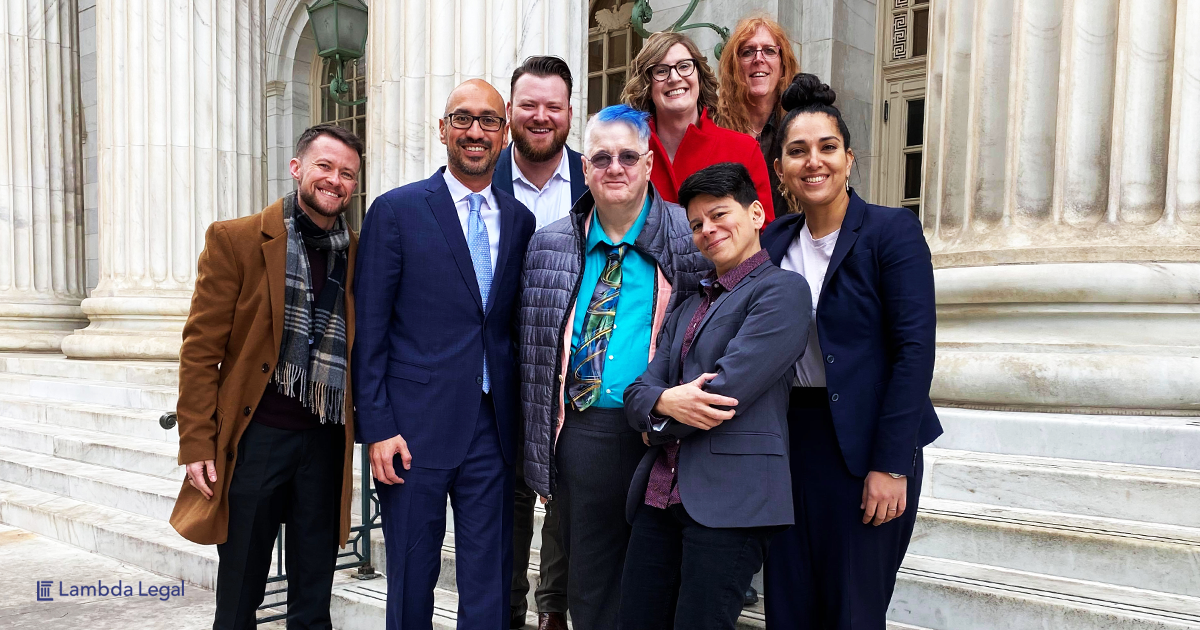The U.S. Court of Appeals for the Tenth Circuit today rejected three of the five reasons the U.S. State Department gave for denying an accurate passport to Dana Zzyym, a U.S. Navy veteran who is intersex and nonbinary, and does not identify as male or female. While the Tenth Circuit held the State Department exercised its authority in an arbitrary and capricious manner, it nonetheless overturned a U.S. District Court ruling in favor of Zzyym and ordered the State Department to reconsider Dana’s passport application anew.
In its ruling, the court did note that forcing nonbinary intersex individuals like Dana to pick a male of female gender marker in the passport application “injects inaccuracy into the data.” From the ruling:
“A chef might label a jar of salt a jar of sugar, but the label does not make the salt any sweeter. Nor does requiring intersex people to mark “male” or “female” on an application make the passport any more accurate.”
“While we may have wanted a more definitive ruling from the Tenth Circuit, the court recognized that treating every applicant as male or female is inconsistent with its own goal to issue an accurate identity document,” Lambda Legal Counsel Paul D. Castillo said. “The court wants the State Department – for the third time – to reconsider Dana’s passport application, so we continue our battle.”
“I started the process to get an accurate passport more than five years ago,” Zzyym said. “In those five years, I’ve been invited to present at several international conferences on issues confronting intersex individuals. I’ve been unable to attend because I don’t have an accurate passport. While this ruling is disappointing, I’m not deterred. I knew this would be a long battle, and I’m ready to continue the fight.”
Dana Zzyym, who uses the gender-neutral pronouns “they,” “them” and “their,” was born with ambiguous sex characteristics. After their parents decided to raise them as a boy, Dana underwent several irreversible, painful and medically unnecessary surgeries that didn’t work, traumatized Dana and left them with severe scarring. Many years later, after serving six years in the U.S. Navy and then attending Colorado State University, Dana began researching surgeries and came to understand they had been born intersex.
Dana currently serves as associate director for Intersex Campaign for Equality. As part of their work, Dana has been invited to attend several international intersex conferences. However, they have been unable to attend because they do not have a valid passport. The passport application requires that the applicant select a gender marker of either ‘male’ or ‘female.’ It also requires first-time applicants to submit evidence of citizenship, such as a birth certificate, which in Dana’s case lists their sex as “unknown.” Notwithstanding the information on their birth certificate and the fact that Dana’s doctors with the U.S. Department of Veterans Affairs confirm Dana was born with intersex traits, Dana’s application for a passport has been denied.
In October 2015, Lambda Legal filed a lawsuit in the U.S. District Court for the District of Colorado, asserting that the U.S. State Department violated the federal Administrative Procedure Act, among other claims, by denying Dana a passport that accurately reflects their gender. The Court issued its rulings in favor of Zzyym on November 22, 2016, and, after a second hearing, again on September 19, 2018. The State Department then appealed to the Tenth Circuit.
“In the intervening five years since we first filed, we’ve won two district court rulings, more than a dozen U.S. states and the District of Columbia now offer accurate identity documents for their residents and U.S. Rep. Ro Khanna introduced a bill requiring the State Department to offer an X gender marker for passports applicants,” Castillo added. “This is the third time a court has rejected key assertions in the State Department’s case. It’s also well past time that the State Department issues Dana Zzyym a passport that accurately reflects who they are.”
At least ten countries issue passports with gender markers other than “F” (female) or “M” (male), including Australia, Bangladesh, Canada, Denmark, Germany, India, Malta, Nepal, New Zealand and Pakistan. Most countries that offer a third marker in the sex field on passports use “X,” a gender marker option that is recognized by the International Civil Aviation Organization (ICAO), a United Nations agency that sets forth international travel document standards.
More information about the lawsuit can be found here.
The Intersex Campaign for Equality and its Founding Director, Hida Viloria, played a critical role in bringing Dana’s case forward.
Handling the case for Lambda Legal are Paul D. Castillo, Camilla B. Taylor, and Puneet Cheema, joined by pro-bono co-counsel Emily E. Chow, Ann E. Prouty, and Rory F. Collins of Faegre Baker Daniels LLP.





